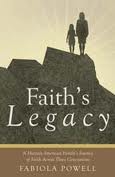
The role of religion is sometimes seen as antiquated in today’s world. In our post-modern society, being religious is seen as a holdover from simpler times. However, to many people it is a solid foundation for them and their family. One such person is Fabiola Powell. She shares the role of faith in three generations in her family in the book Faith’s Legacy. Recently, Polite On Society had the opportunity to interview Fabiola about her book, her faith, and her inspiration to write her story.
Polite On Society: What inspired you to write Faith’s Legacy?
Fabiola Powell: I was inspired to write Faith’s Legacy after complications that arose from the birth of my daughter in 2002. I was inspired to tell a story about the ordeal that my husband and I endured and as the story began to unfold on paper, another story emerged from within. It is the legacy of faith that three generations of women in my family established which helped me stand firm in the midst of my own personal struggle. This “story within a story” made me realize that the story that I was telling wasn’t just for my family, but for the general public. In writing this memoir, I realized that Faith’s Legacy was providing a platform and a voice to the Haitian woman which has been underrepresented in the media.
POS: Having read your book, you have a very accessible writing style. Who inspires you as a writer?
FP: Edwidge Danticat’s Breath, Eyes, Memory was one the first books that I read from a Haitian, female writer. Ms. Danticat’s books really set the standard for me and demonstrated that the female Haitian perspective is one that must be shared with the world. Our voice has been silent for too long. The voice of the Haitian woman is one of strength and resilience and her story is rich, layered and holds a respectable place in literature and in the media. Ms. Danticat’s compelling and poignant stories really inspired me and motivated me to tell my own story.
POS: How were you able to find out so much about your family’s religious beliefs?
FP: I spent alot of time interviewing family members. My grandmother is one of the main protagonists in the book and since I grew up very closely to her, I was able to write very vividly about my memories of her. In the African American tradition, the griots passed down family legacies from one generation to the next orally, it is equally important to record our family history and to preserve our culture leaving a record for future generations.
